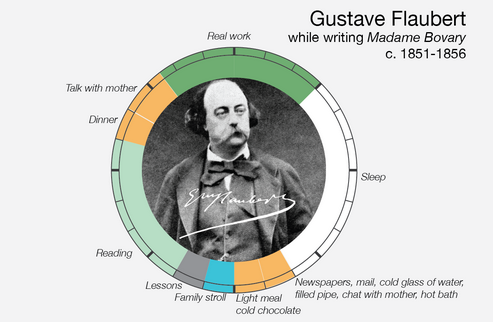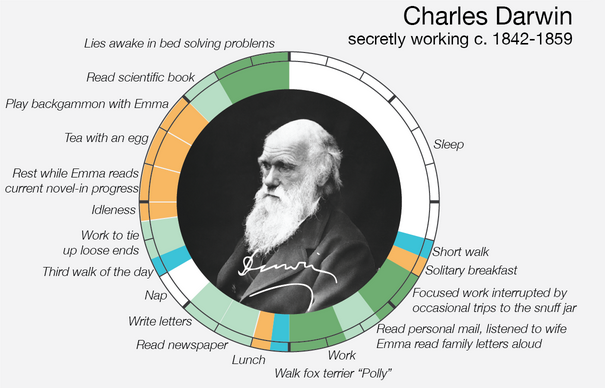You know their work, but do you know how Jane Austen, Benjamin Franklin, and Franz Kafka spent their days? Turns out, they had some pretty interesting daily habits…which you should strongly considering borrowing.
Based on the book Daily Rituals: How Artists Work, RJ Andrews at Info We Trust made a pretty fascinating infographic of the daily habits of some of history’s greatest writers, composers, and other creatives. Obviously, not all of these are great tips — a lot of the thinkers smoked a pipe regularly, drank way too much coffee, and ate questionable food — but plenty of them are worth noting and adding to your own life.
Napping: Studies have shown that “sleeping on it” really does work, though that’s probably not why Charles Darwin and Honoré de Balzac made napping one of their daily habits. Napping has a lot of great benefits, especially for creatives. And while the idea of catching a few moments of rest midday may be perceived as lazy, it can actually be way better for productivity than trying to soldier through a particularly sleepy afternoon.
Sharing your work: The desire to keep your ideas and work to yourself is a strong one among creatives, but as we learned from David Allen, “your head is for having ideas, not holding them.” Maya Angelou read her daily work to her husband every night. Consider letting some of your friends or loved ones in on your projects!
 Being social: Lots of history’s greatest thinkers regularly visited and dined with their friends, which can help fend off the sometimes crippling loneliness of being a creative entrepreneur. Often, our social lives are the first things that get the axe when we’re busy — don’t let that happen!
Being social: Lots of history’s greatest thinkers regularly visited and dined with their friends, which can help fend off the sometimes crippling loneliness of being a creative entrepreneur. Often, our social lives are the first things that get the axe when we’re busy — don’t let that happen!
Reading: This is especially important if you’re a writer, but even Beethoven took time out every day to read the paper (in a tavern, no less). Keeping up on the news, reading a new fiction book, or even just finally delving into that fourteen page think-piece on the New York Times are all ways to get new ideas, find inspiration — and remember that you’re not alone.
Exercising: Charles Darwin took a break every day to walk his dog, Polly. Charles Dickens took “strenuous walks” through the countryside. It doesn’t have to be hours of running, but do get outside and get your blood circulating.
Having a plan: What good are you doing today? Benjamin Franklin used to begin and end every day asking himself what good he wanted to do and what good he had done. Make having a plan for the day — beyond just what errands you’re running — one of your daily habits, then check in regularly with it.
Taking breaks: Giving yourself a chance to do something other than work in the middle of the day, whether it be a lunch with family or a quiet project, was a popular one with many of the greats. W.H. Auden did the crossword. Charles Darwin played backgammon with his wife. Even a quick lunchtime game of solitaire could be enough to get your brain cleared out for a little while.
Decompressing at the end of the day: René Descartes and Charles Darwin both regularly allowed themselves time in bed at the end of every night to think about their day and come up with ideas, and, it’s safe to say, they didn’t do it with the TV on. Not only is this great for your brain, it’s also good for your sleep hygiene.
Want to see more? Check out this cool chart from Info We Trust, based on this book by Mason Currey.



